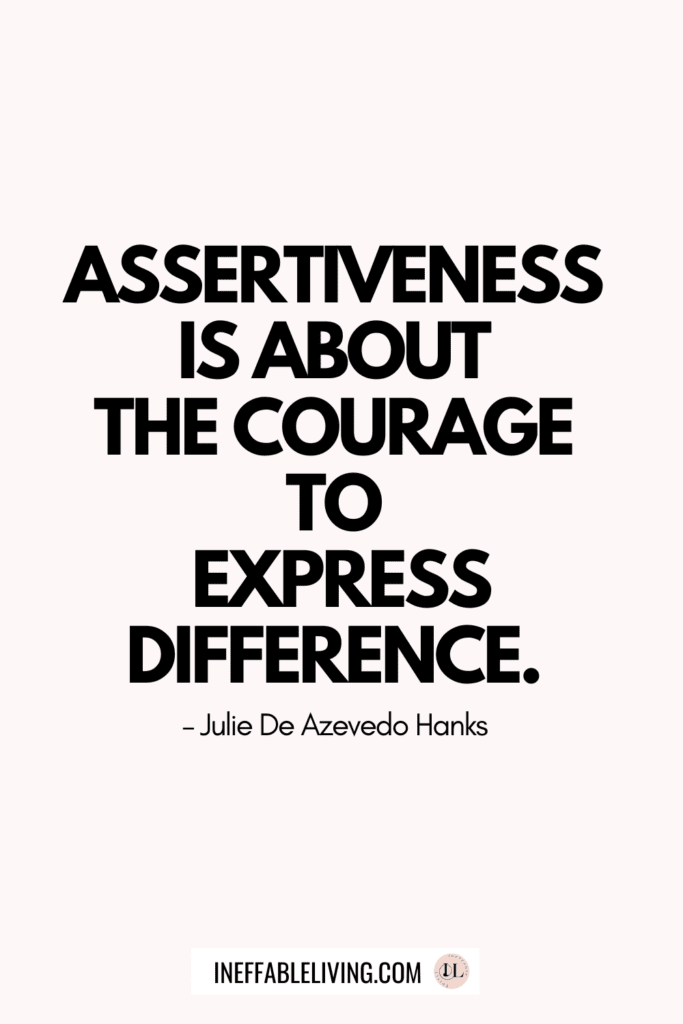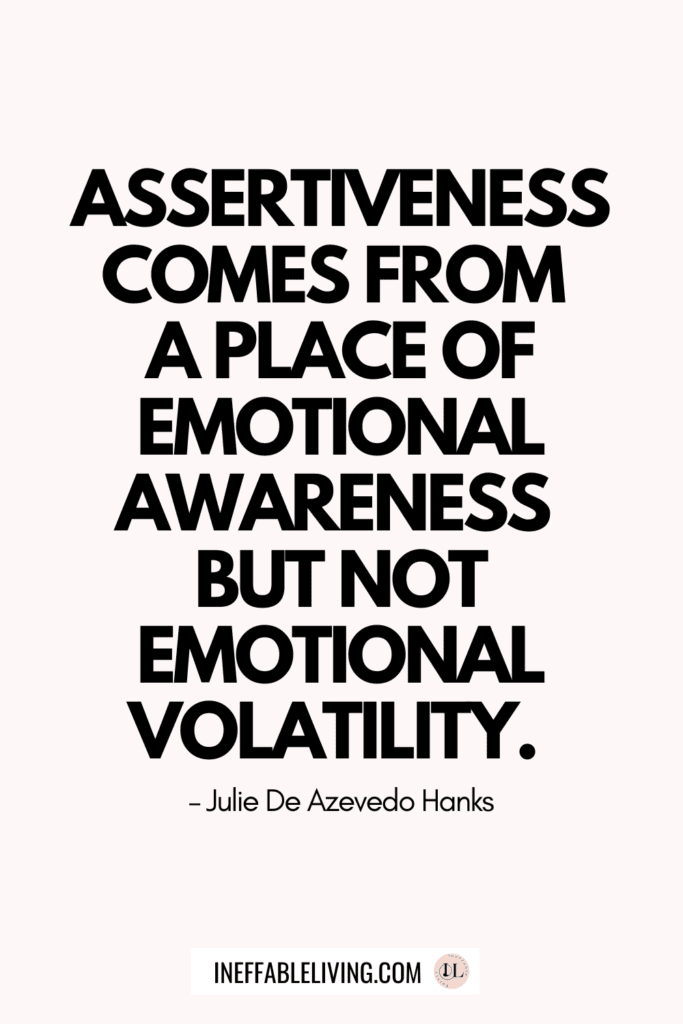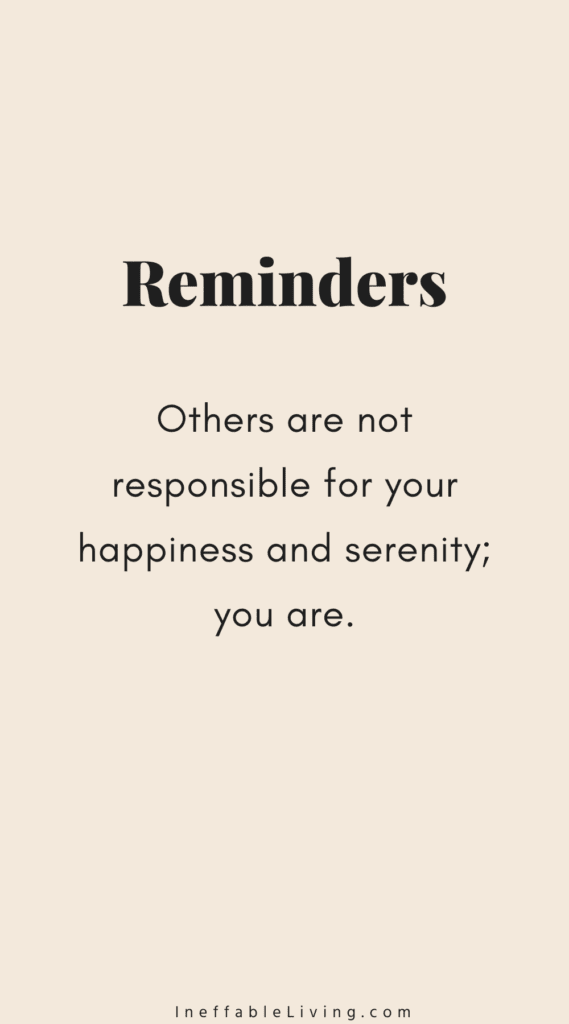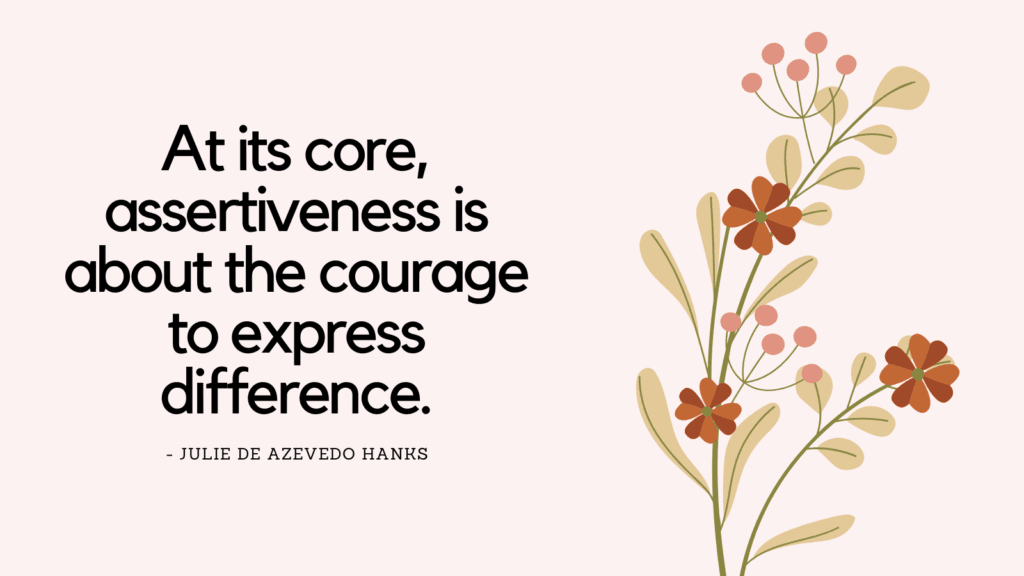This post contains some of the best assertiveness quotes.
What Is Assertiveness?
Assertiveness is the ability to express your thoughts, feelings and needs in a clear and confident manner, without being aggressive or passive.
It involves communicating assertively, standing up for yourself when necessary, and setting boundaries that are respected by others.
Assertive behavior can help you to achieve your goals, build self-confidence, and improve your relationships with others. It is an important skill to have in personal and professional settings.
Assertiveness Quotes
1. “..there are specific skills that you can develop and practice that are key to creating healthier relationships. And it begins with assertiveness.” – Julie De Azevedo Hanks
2. “Assertiveness is generally defined as a way of communicating that is clear, confident, and self-assured. It enables you to express your thoughts, feelings, needs, and wants without infringing on the rights of others.” – Julie De Azevedo Hanks
3. “Assertiveness skills help you articulate your unique sense of self while maintaining your connection with others and allowing them to have an experience that is different from yours.” – Julie De Azevedo Hanks
4. “At its core, assertiveness is about the courage to express difference.” – Julie De Azevedo Hanks
5. “Because assertiveness is an expression of difference (there’s no real need to be assertive if our thoughts and feelings are in perfect unison with someone else, right?), it is common for women to fear that these differences will create problems or distance in the relationship.” – Julie De Azevedo Hanks
Related: Why Nice Guys Suck? Best 19 Practical Strategies To Stop Being The Nice Guy
6. “Assertiveness is clearly a loaded word that has different shades of meaning.” – Julie De Azevedo Hanks
7. “Assertiveness comes from a place of emotional awareness but not emotional volatility.” – Julie De Azevedo Hanks

8. “Keep in mind that assertiveness skills aren’t about pleasing other people or about elevating yourself above others. Assertiveness is about treating yourself as an equal with others and taking owner-ship of your well-being while respecting others’ differences.” – Julie De Azevedo Hanks
9. “Another societal barrier that creates difficulty for women to be authentic and assertive in relationships is the cultural norm of measuring our self-worth based on where we stand, or rank, in comparison to others.” – Julie De Azevedo Hanks
Related: People Pleaser Quiz (+Top 21 Proven Ways to Stop People Pleasing)
Personal Bill of Right
10. “…assertiveness is not being rude or pushy; it’s the ability to both recognize your relationship patterns and identify and manage your emotions so you can take a stand for yourself or others.” – Julie De Azevedo Hanks
11. “Assertiveness also includes being willing to use congruent body language to back up your words with actions when words are not enough.” – Julie De Azevedo Hanks
12. “The ability to be assertive—to clearly and confidently express your feelings, thoughts, needs, and wants even when they differ greatly from others who are important to you—is essentially an expression of differentiation.” – Julie De Azevedo Hanks
13. “Assertiveness is a way that you express difference while remaining connected.” – Julie De Azevedo Hanks
14. “Some of the challenges to assertiveness for a woman who has an avoidant attachment style are difficulty acknowledging and identifying emotions, a reluctance to trust that others will be responsive if she speaks up, and the belief that it’s better to simply “let things go” rather than to address feelings and needs.” – Julie De Azevedo Hanks

Related: Top 25 Tips On How To Set Boundaries In A Toxic Relationship? (+FREE Worksheets PDF)
15. “In addition to sharing our feelings, assertiveness also includes being aware of and expressing our thoughts, our needs, and our wants to others. In our lived experience, feelings, thoughts, needs, and wants are interconnected and inform each other.” – Julie De Azevedo Hanks
16. “What does self-compassion have to do with assertiveness? The practice of self-compassion allows you to be aware, to tune in, to be mindful of your experiences, and to provide comfort and self-nurturing when you need it. That is, to think and act in comforting and compassionate ways toward yourself.” – Julie De Azevedo Hanks
17. “Communication is assertiveness in action. How do you use your words, body language, tone, and other nonverbal cues to share your emotions, needs, and desires to others?” – Julie De Azevedo Hanks
18. “Central to the conversation of assertiveness is the concept of boundaries. Boundaries are like the membrane of a cell. The membrane differentiates the cell as a self-contained unit and also mediates what comes into the cell and what is expelled.” – Julie De Azevedo Hanks
Related: Healthy Boundaries Quiz (+Free Pdf Worksheets)

19. “Although assertiveness isn’t always calm or “Zen,” the emotional intensity that accompanies certain situations comes from an intentional place, not a reactive place.” – Julie De Azevedo Hanks
20. “Too often assertiveness is mistaken for getting so fed up that you blow up. That is not assertiveness. Assertiveness is intentional, even when it’s emotionally intense.” – Julie De Azevedo Hanks
21. “Part of healthy assertiveness is the ability to speak up and stand up without silencing or disregarding someone else or violating his or her rights.” – Julie De Azevedo Hanks
22. “… many of those who are eager to please equate pleasing people with kindness and being good. Conversely, they equate saying no and self-assertion with harshness and being bad. This mindset makes them vulnerable to being taken advantage of, as they do everything they can to preserve that image of always being “good.”” – Patrick King
23. “…a lack of assertiveness can rise when people behave from a plain fear of confrontation. They would rather bite their tongue until they bleed than say anything to rock the boat, ultimately building a life of resentment and unexpressed emotions.” – Patrick King
24. “A lack of assertiveness may also result from the belief that asserting yourself automatically makes you a bad person, the kind who aggressively imposes their needs and wants on others.” – Patrick King
25. “Assertiveness allows you to let people know where you stand, but in a way that doesn’t change your relationship, and doesn’t attach negativity to the situation. If those things do happen, it won’t be because of your actions or words.” – Patrick King
26. “Assertiveness fits right into the slow between nice and aggressive.” – Patrick King
27. “Assertiveness involves becoming more comfortable with risk and allowing errors to occur.” – Randy J. Paterson
Related: Top 5 Tips On How To Be Assertive Without Being Rude
28. “Assertiveness is a style of communication that can be used in all of these situations. But it is only one of four such styles. The other three are the passive style, the aggressive style, and the passive-aggressive style.” – Randy J. Paterson
29. “Assertiveness is about being able to speak your mind and stand up for yourself when the situation calls for it. It’s about being self-assured and confident without being aggressive or arrogant.” – Patrick King
30. “Assertiveness is asking for what you want, turning others down, and making decisions that are right for you without anger, threats, manipulation, or fear of repercussions.” – Patrick King
31. “Assertiveness is meant to improve our interpersonal relationships. As a result, we might expect everyone around us to be very enthusiastic when we become more assertive. We might imagine that they will be extremely encouraging and supportive. Well, don’t count on it.” – Randy J. Paterson
32. “Assertiveness is not a strategy for getting your own way. Instead, it recognizes that you are in charge of your own behavior and that you decide what you will and will not do.” – Randy J. Paterson
33. “Assertiveness is quieter, calmer, and more effective in the long run.” – Randy J. Paterson
Related: Top 35 Boundaries Affirmations To Help You Become More Assertive
34. “Assertiveness is something you may recognize as decidedly “not nice.” And that’s okay.” – Patrick King
35. “Assertiveness is the only way to guarantee that someone in the world has your best interests at heart.” – Patrick King
36. “Assertiveness is, in theory, as easy as saying those simple phrases: “No,” “I don’t want to,” and “Are you trying to take advantage of me?” But in practice, it’s one of the most difficult lines to tread.” – Patrick King
37. “Assertiveness may mean holding ourselves back from our automatic ways of doing things. It doesn’t come easily.” – Randy J. Paterson
38. “Assertiveness often involves setting boundaries around what you will and will not tolerate—especially when it affects you.” – Randy J. Paterson
39. “Assertiveness requires a delicate balance, especially if you are new to it.” – Patrick King
40. “Assertiveness skills can be difficult to learn. Many of us grow up without learning to use them effectively. As well, assertiveness sometimes goes against our temptations. Sometimes we want to push other people to do our bidding. Sometimes we are desperately afraid of conflict.” – Randy J. Paterson
41. “Becoming an assertive person who knows how to stand up for themselves takes far more than a few simple phrases in the guise of communication skills. It requires a deep look into the relationship you have with others, and more importantly, the relationship you have with yourself.” – Patrick King
Related: Boundary vs Control
42. “Being assertive does not mean always getting your way. But when you take time to articulate reasonable requests, chances are good that they will be met.” – Patrick King
43. “Being assertive doesn’t make you a bad person; in fact, assertiveness is good. It’s a quality necessary for you to nurture productive and satisfying relationships with others.” – Patrick King
44. “Being assertive is calmly standing up for your rights and respectfully influencing others in potentially stressful situations.” – Patrick King
45. “Being assertive is understanding that you can’t control what others may do, but you can control your own behavior.” – Patrick King
46. “Beliefs, especially those related to assertiveness, are often intertwined so intricately with your personal history, critical experiences, and general temperament that they tend to be melded with who you are.” – Patrick King
47. “But assertiveness is really a set of skills, not a type of person. And like most skills, they can be learned.” – Randy J. Paterson
48. “Clearly, the most effective way of increasing assertiveness is to get better at asking for what you want.” – Patrick King
49. “Even if you aren’t interested in pleasing people, you might be pushed into it indirectly through a crippling fear of confrontation.” – Patrick King
50. “In some families, assertiveness unfortunately leads to violence. “How dare you say ‘no’ to me! I’ll show you!”” – Randy J. Paterson
Related: Best 10 Books On Being Assertive
51. “It is true that the assertive style doesn’t come naturally to everyone. Some people have an easier time using an assertive style than others do. Perhaps some of the reason for this is inborn. It might be partly due to upbringing. If you grew up in a family in which being assertive was punished, you may have learned to avoid trying to be assertive.” – Randy J. Paterson
52. “Lacking assertiveness can be a hard habit to kick, especially because it’s not a blatantly nasty tendency to have.” – Patrick King
53. “One of the hallmarks of a lack of assertiveness is the inability to say no to others, voice out your opinions and emotions, and assert what you want.” – Patrick King
54. “One way to make assertiveness easier is to have remind ourselves of what we’re missing out on in our lives—what’s at stake. It is anything but trivial, and it compounds on a daily basis if you don’t speak up.” – Patrick King
55. “Remind yourself that assertiveness is not all-or-nothing (either you get it or you don’t).” – Randy J. Paterson
56. “Some people think of assertiveness as a middle ground between passivity and aggressiveness. That is, some believe that assertiveness is more aggressive than the passive style but more passive than the aggressive style.” – Randy J. Paterson
57. “The ability to drive is not a personality trait. Neither is assertiveness.” – Randy J. Paterson
Related: Best 9 Tips On How To Receive More In Life And Relationships?
58. “The accumulation of contorted messages saying you must be selfless to be a good person leads to feeling guilty or selfish for asserting these rights. Losing sight of your personal bill of rights happens because of the conditioning that forces you to believe you should put others before yourself unconditionally.” – Patrick King
59. “The great cost of your lack of assertiveness is a life that doesn’t resemble anything you’ve ever wanted.” – Patrick King
60. “The mindset of assertiveness is important, but so is knowing the potential ways in which we sabotage ourselves. Sometimes, we think we’ve asked or asserted ourselves, but in reality we haven’t said anything at all.” – Patrick King
61. “There are four specific toxic beliefs that undermine your ability to be assertive. They are: (1) the belief that you live only to please and serve others, (2) the belief that you’re unworthy of love as you are, (3) the belief that asserting yourself means you’re a bad person, and (4) the belief that it’s always better to just go along with others.” – Patrick King
62. “Think of assertiveness as a bubble protecting your values, availability, capability, and needs—your confident bodyguard who stops things from spiraling out of control.” – Patrick King
63. “We all have needs, psychological or physical, and the inability to be assertive means your needs will often go unfulfilled.” – Patrick King
64. “What does assertiveness mean to you? I can tell you what it means to me: freedom. It’s not necessarily freedom from others or from the obligations in my life, but assertiveness is the freedom to choose what I want to do and not be beholden to people, places, and things.” – Patrick King
65. “You can’t control what others do or how they might respond to you, but you can control your own behavior.” – Patrick King
Related: Boundaries vs Ultimatum

How to Become More Assertive?
Assertiveness is a crucial skill that can empower individuals to communicate their thoughts, needs, and boundaries effectively while maintaining respect for others.
1. Self-awareness and Reflection
Begin by developing self-awareness and reflecting on your communication style.
Pay attention to situations where you feel passive or aggressive and examine the underlying emotions and thoughts that drive these behaviors.
Identifying patterns will allow you to gain insight into the areas in which you want to grow.
2. Realigning Beliefs and Thoughts
Challenge negative beliefs and thoughts that may be holding you back from being assertive.
These beliefs often stem from fear of rejection, conflict, or social disapproval.
By challenging irrational or unhelpful thoughts and replacing them with more realistic and positive ones, you can build confidence in expressing yourself assertively.
Related: What Causes Cognitive Distortions? (+Top 10 Common Cognitive Distortions & How To Challenge Them)
3. Practice Active Listening
Active listening is a fundamental aspect of assertiveness.
When engaged in conversation, truly focus on understanding the speaker’s perspective.
Maintain eye contact, provide verbal and nonverbal cues to show interest, and avoid interrupting.
By demonstrating active listening, you create a foundation of mutual respect and understanding.
4. Utilize “I” Statements
“I” statements are powerful tools for assertive communication. Instead of making accusatory statements, express your feelings, needs, and concerns using phrases such as “I feel,” “I need,” or “I would like.”
This approach allows you to assert your own position without attacking or blaming others, promoting effective communication.
5. Set Clear Boundaries
Establishing clear boundaries is crucial for assertiveness.
Reflect on your personal values and limits, and communicate them assertively and respectfully to others.
Be consistent in upholding these boundaries and assertively enforce consequences when they are crossed.
Remember, asserting boundaries is essential for healthy relationships.
Related: How To Set Boundaries With A Narcissist?
6. Manage Anxiety and Stress
Anxiety and stress can hinder assertiveness by amplifying self-doubt or triggering defensive responses.
Implement stress management techniques such as deep breathing exercises, mindfulness, or seeking professional support if necessary.
By managing anxiety and stress, you can better express yourself assertively.
7. Learn Conflict Resolution Skills
Conflict is an inevitable part of life, and learning how to navigate it assertively is crucial.
Enhance your conflict resolution skills by understanding different perspectives, practicing empathy, seeking win-win solutions, and using effective negotiation techniques.
This approach fosters assertiveness while maintaining respect for others involved.
8. Gradual Exposure to Challenging Situations
Practice assertiveness gradually by exposing yourself to increasingly challenging situations.
Start with low-stakes scenarios and gradually work your way up.
This allows you to build confidence and refine your assertiveness skills over time.
Related: Best 9 Tips On How To Stop Avoidance Cycle (+FREE Worksheets PDF)
9. Seeking Support
If you find it challenging to develop assertiveness on your own, consider seeking support from a qualified professional, such as a psychologist or counselor.
They can help you explore underlying issues, provide guidance, and offer assertiveness training tailored to your unique needs.
10. Celebrate Successes and Learn from Setbacks
Acknowledge and celebrate your progress towards becoming more assertive. Recognize both small and significant victories along the way.
It is also important to remember that setbacks are a natural part of growth.
Instead of dwelling on them, use setbacks as opportunities for learning and further improvement.
Conclusion
Developing assertiveness is a journey that requires self-reflection, practice, and perseverance.
By cultivating self-awareness, challenging negative beliefs, practicing active listening, setting boundaries, managing anxiety, and seeking support when needed, you can unlock your assertive potential.
Remember, becoming more assertive allows you to communicate effectively, express your needs, and maintain healthy relationships.
Embrace the process and trust in your ability to grow and evolve assertively.

References
- Portions of this article were adapted from the book The Assertiveness Guide For Women, © 2016 by Julie De Azevedo Hanks. All rights reserved.
- Portions of this article were adapted from the book The Art of Everyday Assertiveness, © 2018 by Patrick King. All rights reserved.
- Portions of this article were adapted from the book The Assertiveness Workbook, © 2000 by Randy J. Paterson. All rights reserved.



